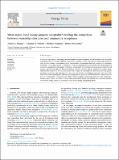Files in this item
What makes local energy projects acceptable? Probing the connection between ownership structures and community acceptance
Item metadata
| dc.contributor.author | Hogan, Jessica | |
| dc.contributor.author | Warren, Charles Raymond | |
| dc.contributor.author | Simpson, Michael | |
| dc.contributor.author | McCauley, Darren | |
| dc.date.accessioned | 2022-09-27T10:30:28Z | |
| dc.date.available | 2022-09-27T10:30:28Z | |
| dc.date.issued | 2022-12-01 | |
| dc.identifier | 281381974 | |
| dc.identifier | 40554bf4-03ce-4272-a6e7-729fb362b92c | |
| dc.identifier | 85138792105 | |
| dc.identifier | 000868976300012 | |
| dc.identifier.citation | Hogan , J , Warren , C R , Simpson , M & McCauley , D 2022 , ' What makes local energy projects acceptable? Probing the connection between ownership structures and community acceptance ' , Energy Policy , vol. 171 , 113257 . https://doi.org/10.1016/j.enpol.2022.113257 | en |
| dc.identifier.issn | 0301-4215 | |
| dc.identifier.other | ORCID: /0000-0003-2322-5360/work/120051510 | |
| dc.identifier.other | ORCID: /0000-0003-4449-4068/work/120051925 | |
| dc.identifier.uri | https://hdl.handle.net/10023/26074 | |
| dc.description | Funding: Social Sciences and Humanities Research Council of Canada (752-2019-0520), Rothermere Foundation, Canadian Centennial Scholarship Fund, University of St Andrews. | en |
| dc.description.abstract | Community ownership of wind energy has been found to increase acceptance, but the reasons for this are poorly understood. Here, we compare different communities’ attitudes towards local onshore wind energy projects in order to gain a deeper understanding of the characteristics of ownership which are conducive to community acceptance. Using a postal survey in Scotland (n = 318), we compared three communities with varying degrees of ownership regarding their (1) support for the local wind project; (2) perceptions of energy justice; (3) perceived impacts; and (4) ownership and benefit preferences. One-way ANOVAs and the Potential for Conflict Index2 identified that residents in the two communities with a degree of ownership were more associated with greater acceptance, processes, and outcomes (i.e. more just and inclusive development processes and more fairly distributed benefits and impacts), than residents living near the privately-owned development. Additionally, we provide evidence that a co-operative can achieve similar acceptance and energy justice as a fully community-owned project. Overall, the results indicate that policymakers should take seriously the connection between the tenets of energy justice and ownership models in their policy and planning efforts. | |
| dc.format.extent | 13 | |
| dc.format.extent | 4953108 | |
| dc.language.iso | eng | |
| dc.relation.ispartof | Energy Policy | en |
| dc.subject | Community | en |
| dc.subject | Wind energy | en |
| dc.subject | Acceptance | en |
| dc.subject | Energy justice | en |
| dc.subject | Benefits | en |
| dc.subject | GE Environmental Sciences | en |
| dc.subject | E-DAS | en |
| dc.subject | SDG 7 - Affordable and Clean Energy | en |
| dc.subject | MCC | en |
| dc.subject.lcc | GE | en |
| dc.title | What makes local energy projects acceptable? Probing the connection between ownership structures and community acceptance | en |
| dc.type | Journal article | en |
| dc.contributor.institution | University of St Andrews. Centre for Energy Ethics | en |
| dc.contributor.institution | University of St Andrews. Environmental Change Research Group | en |
| dc.contributor.institution | University of St Andrews. School of Geography & Sustainable Development | en |
| dc.contributor.institution | University of St Andrews. Office of the Principal | en |
| dc.contributor.institution | University of St Andrews. Geographies of Sustainability, Society, Inequalities and Possibilities | en |
| dc.contributor.institution | University of St Andrews. St Andrews Sustainability Institute | en |
| dc.identifier.doi | 10.1016/j.enpol.2022.113257 | |
| dc.description.status | Peer reviewed | en |
This item appears in the following Collection(s)
Items in the St Andrews Research Repository are protected by copyright, with all rights reserved, unless otherwise indicated.

